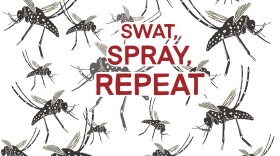
Laura Pellicer
Digital Reporter/ Co-Host, "CREEP" PodcastLaura Pellicer is a digital reporter with WUNC’s small but intrepid digital news team. She is also the co-host and co-creator of CREEP, an award-winning podcast about creatures invading our space and changing the world around us.
Before that, she was a producer with The State of Things, a show that explores North Carolina through conversation. Her coverage at WUNC of the controversial Silent Sam Confederate monument garnered a Gracie Award from the Alliance for Women in Media.
Laura was born and raised in Montreal, Quebec, a city she considers arrestingly beautiful, if not a little dysfunctional. She worked as a researcher for CBC Montreal and contributed to their programming as an investigative journalist, social media reporter, and special projects planner.
Laura loves tracing innovations in science and technology, and pursuing stories about Indigenous communities and environmental justice. She is enamored with her home in North Carolina — notably the lush forests, and the waves where she moonlights as a mediocre surfer.
You can reach her via email at lpellicer@wunc.org.
-
Iguanas didn’t always fall out of trees during cold snaps in the Sunshine State, but chances are, future generations will regard them as just a natural part of the landscape. With the world changing around us at a rapidly increasing rate, how do we set conservation goals when we can't keep track of what we’ve lost?
-
The exotic pet industry is one of the main pathways for introducing invasive species into new environments. It can be hard for non-herpers to understand what’s so attractive about living with these creatures. In this first of a series of bite-sized episodes, reptile enthusiast Tim Jackowicz takes us into his world, where giant snakes and lizards offer an opportunity to rethink how we approach the world around us.
-
As if our native mosquitoes weren’t pesky enough, we humans have imported some of the most invasive mosquito species to the U.S., bringing with them painful and debilitating diseases. Is there a human solution to this human-caused problem? Or are we destined to see history repeat itself, as we try (again and again) to outwit the deadliest animal on the planet?
-
Harris will highlight the Inflation Reduction Act, a comprehensive tax, health care, and climate change bill that passed on Aug. 12.
-
Officials with Wake County Public Health say two women in the county have tested positive for the monkeypox virus. These are the first cases confirmed in women in North Carolina.
-
This voracious species feeds on the juveniles of commercially important fish like grouper and snapper.
-
Worst. Marine. Invasion. Ever. Prized as pets for their mesmerizing beauty, an aquarium keeper’s dream has become an environmental nightmare as legions of venomous, voracious lionfish are now guzzling up fish and further endangering coral reefs throughout the Atlantic, Caribbean and Gulf of Mexico. Researchers, inventors, divers and fishers are urgently trying to find new ways to stem the tide of these undersea marauders.
-
Beyond the hype about Pablo Escobar’s cocaine hippos, the real story of what’s happening in Colombia’s Rio Magdalena is surprising and complex. Some look on these hungry herbivores with affection and admiration, others fear their aggressive attitude and huge ecological footprint. Follow these unlikely invaders from Africa to Colombia with a possible layover in…Louisiana?
-
If you had to guess the top five largest invasive species in the world, where would you start? And why, exactly, are we moving these behemoths around the globe?
-
Tegus are armed with a metabolic superpower and a powerful appetite for eggs, but they’re also easily domesticated, making them both beloved family pets and unwelcome hungry pests. Throughout the South, these giant lizards are raising eyebrows, breaking hearts and launching lawsuits.








